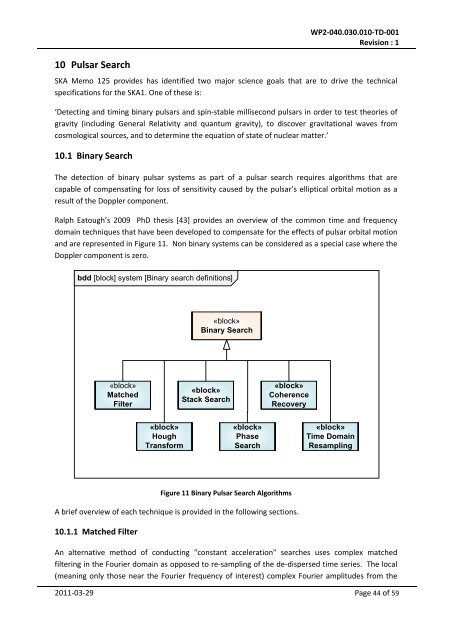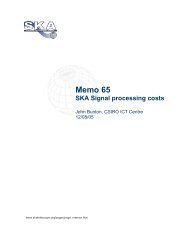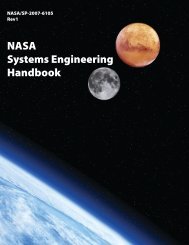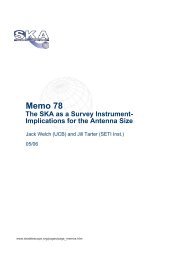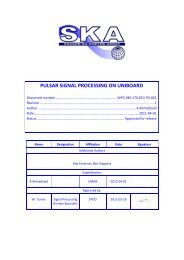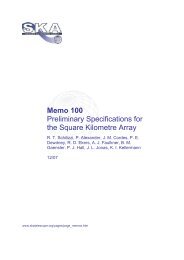high-level ska signal processing description - The Square Kilometre ...
high-level ska signal processing description - The Square Kilometre ...
high-level ska signal processing description - The Square Kilometre ...
Create successful ePaper yourself
Turn your PDF publications into a flip-book with our unique Google optimized e-Paper software.
10 Pulsar Search<br />
WP2‐040.030.010‐TD‐001<br />
Revision : 1<br />
SKA Memo 125 provides has identified two major science goals that are to drive the technical<br />
specifications for the SKA1. One of these is:<br />
‘Detecting and timing binary pulsars and spin‐stable millisecond pulsars in order to test theories of<br />
gravity (including General Relativity and quantum gravity), to discover gravitational waves from<br />
cosmological sources, and to determine the equation of state of nuclear matter.’<br />
10.1 Binary Search<br />
<strong>The</strong> detection of binary pulsar systems as part of a pulsar search requires algorithms that are<br />
capable of compensating for loss of sensitivity caused by the pulsar’s elliptical orbital motion as a<br />
result of the Doppler component.<br />
Ralph Eatough’s 2009 PhD thesis [43] provides an overview of the common time and frequency<br />
domain techniques that have been developed to compensate for the effects of pulsar orbital motion<br />
and are represented in Figure 11. Non binary systems can be considered as a special case where the<br />
Doppler component is zero.<br />
bdd [block] system [Binary search definitions]<br />
«block»<br />
Binary Search<br />
«block»<br />
Matched<br />
Filter<br />
«block»<br />
Stack Search<br />
«block»<br />
Coherence<br />
Recovery<br />
«block»<br />
Hough<br />
Transform<br />
«block»<br />
Phase<br />
Search<br />
«block»<br />
Time Domain<br />
Resampling<br />
Figure 11 Binary Pulsar Search Algorithms<br />
A brief overview of each technique is provided in the following sections.<br />
10.1.1 Matched Filter<br />
An alternative method of conducting "constant acceleration" searches uses complex matched<br />
filtering in the Fourier domain as opposed to re‐sampling of the de‐dispersed time series. <strong>The</strong> local<br />
(meaning only those near the Fourier frequency of interest) complex Fourier amplitudes from the<br />
2011‐03‐29 Page 44 of 59


